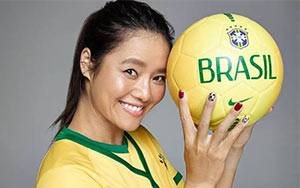China’s most successful tennis player Li Na announced her retirement on social media on Friday morning, confirming recent reports that repeated knee injuries would see her call time on her professional career. Li, 32, has been a pioneer for Chinese sport and, indeed, has changed the perception of Chinese tennis with victories in the 2011 French Open and 2014 Australian Open, becoming the first Asian player to win a Grand Slam singles title. What makes her success even more impressive is the manner in which she climbed to the top.
Forever controversial, the tennis star’s most contentious quote came in 2011 when she commented of her success: “Don’t say I’m doing this for my country, I’m doing it for myself.” For a fiercely nationalistic country like China, it was considered treachery. But, Li had good reason to claim sole responsibility for her glories having stopped receiving funding from Beijing in 2008, leaving the China national tennis team and appointing her own coaching setup. Her career has never looked back since.
Criticism of her decision came aplenty in China, but Li’s choice has since been repeated by others such as Peng Shuai, Zheng Jie, and Yan Zi, with the former recently reaching the semifinal of the US Open. China’s journalists have since paid for their attitudes towards the star, drawing notoriously tough response from Li as this excerpt from the South China Morning Post demonstrates:
Li turned on Wang Zijiang of official news agency Xinhua when he asked if she had a message for fans back home. “I lost a game and that’s it. Do I need to get on my knees and kowtow to them? Apologise to them?” she snapped in Paris.
A month later at Wimbledon, he asked the same question again. “How dare he? Doesn’t he have any shame?” said Li, who trained as a journalist herself in her 20s.
Her attitudes to party officials and state events (turning down an invitation to appear on CCTV’s New Year show this January) are rarely more forgiving.
Li’s decision was, of course, partly motivated by money—by leaving the Chinese system she was able to retain more of her prize money than when she was representing the national tennis team. However, it also gave her the freedom to control her own schedule and coaching appointments. Given the context, it was a brave choice at the time but one that has paid off handsomely since.
It is impossible to directly correlate Li’s decision to football, with the dynamics of team sports different to those played individually. Also, for many Chinese football players, the financial rewards are stronger should they choose to remain firmly within their comfort zone in China. However, what is patently obvious is that the football system is failing to provide the conditions required to develop elite players, just as Li had felt was the case with the tennis setup. Football, too, needs those who are willing to make bold calls.

Li Na poses with a football in a pre-World Cup photoshoot
From a player development perspective, it is a travesty that someone such as Wu Lei (soon to be 23) remains in China. Having made his senior debut at 14 and kicked on from that point at Shanghai East Asia, he should have been continuing his development in a European environment before his teenage years were up. It is very difficult, though, for a young person to risk their long-term financial stability and future “guanxi” by unilaterally deciding to leave a club to pursue their own career. Wu is not alone in remaining loyal longer than would normally be expected.
There are, though, players beginning to see the stagnation that widely occurs with China’s better young talents and are opting to take matters into their own hands. Shandong Luneng-produced youngsters Wei Shihao and Tang Shi greatly angered the Jinan side earlier this year by walking out on the club to sign deals with Boavista and Botafogo respectively. Wei, the standout star of China’s Under-19 side, made his Liga Sagres debut this past weekend, while Tang is considered to have a reasonable chance of similarly succeeding in Brazil.
Both players have doubtless caused themselves difficulties by choosing to defy Luneng and sign professionally elsewhere, but should be saluted for their decision. Wei is now playing first-team football in the Portuguese top-flight when the chances are he would still be restricted to reserve team football in China given Shandong’s bloated squad’s array of attacking options. Regardless of whether he can hold down a place at a high level in the future, he will be a better and more rounded player for his European football education.
What Li’s story proves is that China will always welcome you back if you succeed, regardless of how it has been achieved. Chinese sport craves success stories and will quickly reclaim those who plot their own path as one of their own if they begin to earn international recognition for their work. Week after week over recent years, Li’s progress was among the leading stories in Chinese sport.
There are, have been and will continue to be talented football players emerging in China over recent years, but they have not been given the conditions needed to reach their full potential—whether it be playing time, correct coaching or even off-field advice. It will always be a risk, but perhaps then it is only by following the example of Li Na that Chinese football can finally produce a star to compete with the world’s best in the near future. Some will doubtless fall by the wayside, but what is clear is that the situation regarding talent development cannot get much worse than at the present time.
